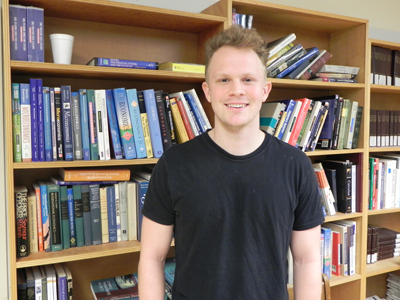Economics student wins 2019 Progressive Economics Forum Student Essay Contest
 Mount Allison University economics student Peter Gale has won the 2019 Progressive Economics Forum Student Essay Contest for best paper for his essay on crime deterrence and punishment. The contest is open to Canadian students, studying at the post-secondary level in Canada and abroad, as well as international students studying in Canada.
Mount Allison University economics student Peter Gale has won the 2019 Progressive Economics Forum Student Essay Contest for best paper for his essay on crime deterrence and punishment. The contest is open to Canadian students, studying at the post-secondary level in Canada and abroad, as well as international students studying in Canada.
Although it was an economics paper, the content was inter-disciplinary, as it drew on law, criminology, and sociology as well as economics. Gale’s essay was initially completed as a requirement for his Econometrics course, which is a class that teaches tools to measure economic relationships.
The professor for the course, Dr. Craig Brett, says, “Whenever I teach Econometrics, I encourage students to write a paper they can be proud of. I am glad that Peter was proud enough of his work to submit it to this competition. I am also happy that the judges noticed the creativity and quality in Peter’s work.”
Gale, who is from Halifax, NS, explained that the paper was inspired by Nobel Prize-winning economist Gary Becker’s work on crime and punishment.
“I like him a lot. He is one of my favourite economists,” he says. “Becker used microeconomic principles to explain things that aren’t economics. For instance, he approached the decision of whether to commit a crime as a cost-benefit analysis, and although it may seem strange, it does do a pretty good job of modelling the relationship.”
Much of Becker’s work was done in the 1970's and 1980's, and a great deal has changed since then. For instance, the U.S. incarceration rate tripled from the 1960’s to 2008, and is currently the highest incarceration rate in the world. Building on this research, Gale worked on a contemporary analysis of crime and punishment for his essay.
“I found was that most States have reached a threshold where increasing the punishment or the sentence length for criminals does not deter crime any more,” he says. “For some States, it actually causes more crime to occur because of recidivism.”
Holding everything else constant, Gale considered the relationship between punishment and the frequency of crime. He found that at lower levels of punishment, increasing severity did indeed deter crime.
“However, the model shows that there is a problem. If you are caught with a bag of marijuana, the sentence could be 20 years in jail. An increase in a sentence from five to ten years may be a deterrent, but an increase of 15-to-20 years seems not to affect people’s behaviour. It is as though a sentence of this length is beyond people’s comprehension."
Gale has begun research on a new project this summer, supported by a Mount Allison Independent Summer Research Grant. He plans to “look under the hood” of the gravity model — a model that is widely used in the area of international trade. Although its structure is based on physical principle of gravity, it enjoys surprising success in explaining trade flows between nations.
The Progressive Economics Forum promotes the development of a progressive economics community in Canada. It is comprised of progressive economists, working in universities, the labour movement, and activist research organizations. Their goal is to promote progressive approaches to economic analysis, policy-making, and activism in Canada.




